Interview: Big Finish director Ken Bentley (2)
Click here for part 1 The Lost Stories: how much input do you get into them? It depends on the Lost Story, and my schedule at the time. I get […]
Click here for part 1 The Lost Stories: how much input do you get into them? It depends on the Lost Story, and my schedule at the time. I get […]
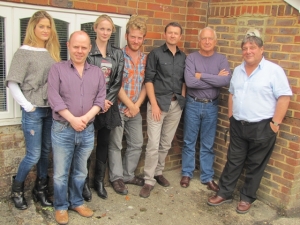
The Lost Stories: how much input do you get into them?
It depends on the Lost Story, and my schedule at the time. I get the impression, particularly with some of the earlier Lost Stories, they were almost complete scripts at the time, so they only required a pass for audio, so there was not a lot for me to look out for in a situation like that. But they always give me the courtesy of reading it before it gets printed and published.
I had more input for the half-finished outlines which are more heavily adapted. Particularly with much longer stories – The Foe From The Future was epic – it’s better to have as many eyes giving it a look as possible. I’m aware of my strengths and weaknesses, so I know I’m looking at it as a very lay person saying, “Does this work in the studio? Do all the pieces of the puzzle make sense? Have we missed anything? Is it a rip-roaring adventure that everybody’s going to be entertained by?” They’re not asking me to do anything heavy – all the spadework has been done.
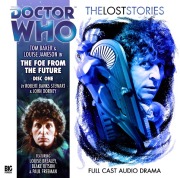 [Producer] David [Richardson] is very aware of the entire schedule, and how much I’ve got on at any one time. He’ll bother me with an earlier read when he knows I’ve got time to do that; other times he’ll let it pass, and say, “Before we publish, give it a quick read.”
[Producer] David [Richardson] is very aware of the entire schedule, and how much I’ve got on at any one time. He’ll bother me with an earlier read when he knows I’ve got time to do that; other times he’ll let it pass, and say, “Before we publish, give it a quick read.”
In an ideal world, I spend a couple of weeks working on a Lost Story, then a couple of weeks on another story – but last year I was in a constant cycle of having three or four plays to read; two or three plays in pre-production, with casting and scheduling; a couple of recordings each week to be prepping for; as well as having three or four stories in post-production. Every time one dropped off in post-production, another one came on. It was like a hamster on a wheel – constantly working through it. So within that spinning wheel, it all merges together!
Did you have a different approach to the Lost Stories?
I have to trust the writers – whether it’s the original writer, or people rewriting them – to be as authentic to the style of the period as possible, keeping an eye out for the rhythm and dialogue of the period, and keeping an eye on what is actually created. I tend to find with the stories that are further down the line before they got to us, they tend to be of a smaller scale because they knew what they could achieve on TV. Other stories, like The Foe From The Future, I don’t know how much was script and how much just outlined by the time it got to Big Finish. You can tell with that story that it’s had the opportunity to grow in the adapting.
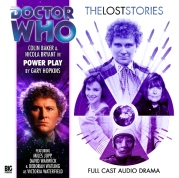 Fundamentally, what we’re doing is something different: we’re not telling stories for TV. What I refuse to do is make a television story on audio, so it sounds like what you’re listening to is the audio track of a programme on TV. I don’t think anybody would appreciate it if I did that: I’ve got to give somebody a fully immersive audio experience.
Fundamentally, what we’re doing is something different: we’re not telling stories for TV. What I refuse to do is make a television story on audio, so it sounds like what you’re listening to is the audio track of a programme on TV. I don’t think anybody would appreciate it if I did that: I’ve got to give somebody a fully immersive audio experience.
The Lost Stories tend to use more story-telling through sound than dialogue…
To the detriment of the Lost Stories?
No, it makes them different. The detriment is sometimes the stories perhaps should stay lost?
David and I are very aware that we’re treading a fine line. What we try to do is make it work as much as we possibly can.
How early did you get involved with Counter-Measures?
What a genius idea of David’s to pull that one together! I’ve got a lot of time for David: he’s one of the best producers I’ve worked with, and what sets him apart is he is also a very creative producer. Counter-Measures is proof of that, to come up with an idea like that, and to get a writing team like that: I think he chose some fantastic writers. He knew what animal it was, and what he needed to do to make it work.
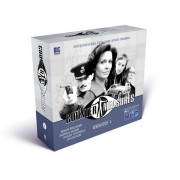 On the first series, it was about the same time as usual. The second draft scripts were sent for me to look over. We were trying to tie together four stories, to make sure we had a coherent arc.
On the first series, it was about the same time as usual. The second draft scripts were sent for me to look over. We were trying to tie together four stories, to make sure we had a coherent arc.
Series 2 I became involved in much earlier in the process than I have been, really because we hope everything we produce is liked, but I think we all felt that we had all achieved something with Counter-Measures. We were very happy with the results, and I don’t have words for how much I admire and respect Jason [Haigh-Ellery] – what a lovely guy to greenlight the second series before we’d even released the first just based on hearing what we had managed to achieve.
As soon as we knew we were going to be doing series 2, we got together to think about what the strengths and weaknesses of series 1 were, and what we can do going ahead. David brought me in at that stage: it was a great privilege. He knows I’m not going to be a hand grenade in a situation like that: I’m used to sitting round with writers going through ideas.
 My input was very broad, more to do with the style. I’ve been saying, “How can we really tie this in to the Sixties?” When I grew up I was a great fan of some of the British television series of that period, and what they were tapping into culturally. They were doing things they had never done before on TV: The Champions had their HQ in Geneva looking across the lake at the fountain in the background. That was an iconic and sexy image at the time. This was the first time people were travelling to Europe quickly and easily. The Saint was this wonderfully cosmopolitan and very European hero. There’s a lovely opening sequence to The Ipcress File: Harry Palmer is getting up in the morning and preparing a Continental breakfast, making coffee in a cafetiere. It’s something which we take for granted now, forty years down the line. We all drink real coffee, but it’s a very different life to the way the British were living in the Fifties. At that time, these images were big cultural shifts in British life and lifestyle. It’s too easy for us to forget those things now. I felt it was important to connect back to that sense of freedom and excitement and fun that they felt in the Sixties.
My input was very broad, more to do with the style. I’ve been saying, “How can we really tie this in to the Sixties?” When I grew up I was a great fan of some of the British television series of that period, and what they were tapping into culturally. They were doing things they had never done before on TV: The Champions had their HQ in Geneva looking across the lake at the fountain in the background. That was an iconic and sexy image at the time. This was the first time people were travelling to Europe quickly and easily. The Saint was this wonderfully cosmopolitan and very European hero. There’s a lovely opening sequence to The Ipcress File: Harry Palmer is getting up in the morning and preparing a Continental breakfast, making coffee in a cafetiere. It’s something which we take for granted now, forty years down the line. We all drink real coffee, but it’s a very different life to the way the British were living in the Fifties. At that time, these images were big cultural shifts in British life and lifestyle. It’s too easy for us to forget those things now. I felt it was important to connect back to that sense of freedom and excitement and fun that they felt in the Sixties.
Did you go back and watch what’s effectively become the backdoor pilot for Counter-Measures, Remembrance of the Daleks?
No. I’ve started to do that purposefully: I’m sort of enjoying being that person who’s removed, and able to step back. I don’t need to do it but I try to be the listener. Of course many of them do watch and connect, but I work on the basis that this is a new original product that somebody who knows nothing about it is going to listen to. It’s my responsibility to ensure someone can pick this off the shelf in 150 years’ time, rip the data off it and listen to it and it makes sense.
I’m not ashamed to say when I don’t know the answer to a question. I’ll let the cast talk to the writer or to David. If something comes up that needs to be talked about, then we do. I feel we’ve got a system that works. If I felt that I wasn’t pulling my weight or contributing effectively to the process, then I’d do more homework, but to be honest I’d have to do a bloody hell of a lot to know as much as everyone else knows. I may as well just ask them and let them tell me rather than try to achieve. There is no shame in asking!
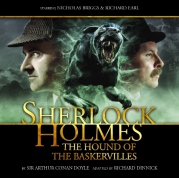 Sherlock Holmes:
Sherlock Holmes:
Nick has been very generous. Because he’s in them, he needed somebody to see things through, keep the schedules running. I think he’s been very generous in offering me a co-director credit, really. The only thing I wasn’t involved with at all was The Perfidious Mariner.
I think Nick and Richard Earl work very well together; I love what Richard is doing with Watson. He works that text so hard: it’s rare to see an actor work the text as hard as he does in the studio. Lovely stuff.
You’ve directed the full cast Blake’s 7 play Warship and The Armageddon Storm. Were you a fan?
I would say no: I remember vividly sitting down and watching Blake’s 7, because I was a little bit older. I can remember some of the Doctor Who stories from when I was very young, but I can remember sitting down to watch Blake’s 7, and enjoying it. I never pursued it into the novelisations and those sorts of things, so for me Blake’s 7 was something I watched 30 years ago, and had not seen since.
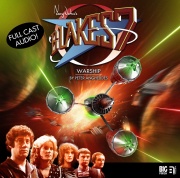 The first time I heard the theme music again was great. It’s one of those moments where the hairs stand up on the back of your neck. It’s really good stuff. I’m looking forward to getting to the edits.
The first time I heard the theme music again was great. It’s one of those moments where the hairs stand up on the back of your neck. It’s really good stuff. I’m looking forward to getting to the edits.
A lovely bunch of people, all did a great job. Paul [Darrow – Avon] is fantastic: he’s sort of the Blake’s 7 equivalent of working with the Doctors on Doctor Who. He and Michael Keating [Vila] both know those characters; every single time right on the moment. I’d worked with Jacqueline [Pearce – Servalan] before: she’d done a Who for us. It was nice that there was a little bit of a connection each time.
Did you treat the Blake’s 7 sessions any differently?
With the Blake’s 7, particularly the first full cast one, it was the first time they’d all got back together for however long it was. It was the first Blake’s 7 I had done. It was one of the rare instances in a Big Finish recording where we were all going in cold, and had to knuckle down and do it. In a situation like that I do tackle it differently, not in story terms, but in terms of how I function as a director: I probably spend a little more time being sensitive to how they work, how they’re functioning together, probably not working it as hard as we might usually.
If you have the luxury of the actors with you for the whole day, do you work chronologically or thematically?
It does depend on the situation. If it’s a one-day recording and we have all the cast there all day, then we’ll record chronologically but I’d still block out certain sequences.
 Blake’s 7 is a good example: it was a one-day and we had everybody all day. What I won’t do is bounce people in and out of the booths continuously. I’ll do a block with one group of characters then a block with another group chronologically, and find the point where they all come back together again. As much as I can, in an ideal world, I’ll try to keep everybody’s scenes chronological to keep the throughline clear for everybody. They may have to sit down for a couple of hours. But that happens very rarely.
Blake’s 7 is a good example: it was a one-day and we had everybody all day. What I won’t do is bounce people in and out of the booths continuously. I’ll do a block with one group of characters then a block with another group chronologically, and find the point where they all come back together again. As much as I can, in an ideal world, I’ll try to keep everybody’s scenes chronological to keep the throughline clear for everybody. They may have to sit down for a couple of hours. But that happens very rarely.
Usually the schedule is determined by the budget: how many people we can have in for how long. One thing we try to do is get as many people involved in a production as we can. I won’t, for the sake of making it easy for me, double it up with the number of characters just so I can have the same people in for two days. I will try to cast as many different actors as I can, which means the schedule becomes completely abstracted with different sequences on different days. We’ve done the second half of a story in the morning, and then the first half in the afternoon.
Scheduling is one of my strengths: I’ve learned the distinction between OCD and OCPD. If you’re OCD they will lock you up; if you’re OCPD, it’s okay, you’re just a bit anal. I enjoy scheduling and the challenge of making a very complicated schedule work. I know it’s worked when everybody has enjoyed the day’s recording despite how fractured and frustrating the schedule has been.
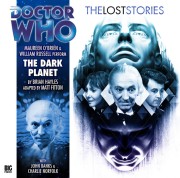 What’s the most challenging thing for you as a director?
What’s the most challenging thing for you as a director?
It probably is when the schedule is particularly complicated. The stories we tell are quite tricky at the best of times, so it can be hard to keep on top of the throughline. It’s my job as the director to make that clear in the edit, and we have to make some quite tough decisions then to make sure that the throughline of a story is clear.
When you’re recording out of sequence it can throw everybody in the studio, because you jump from one moment in the story to another. In situations like that, the biggest challenge is making sure everyone is relaxed and comfortable enough not to get stressed and lose confidence in their ability to do the job because the schedule is quite tricky. If people are having fun, you get better work out of them.
I enjoy working with Big Finish a lot. I had no idea when I got involved that the company produced as much as it produces. It’s a massive output comparing the scale with the number of people working on it. I think we get it right more than we get it wrong.
Many thanks to David Richardson and Paul Spragg for their assistance in setting up this interview, and Ken Bentley for providing some of the photos.